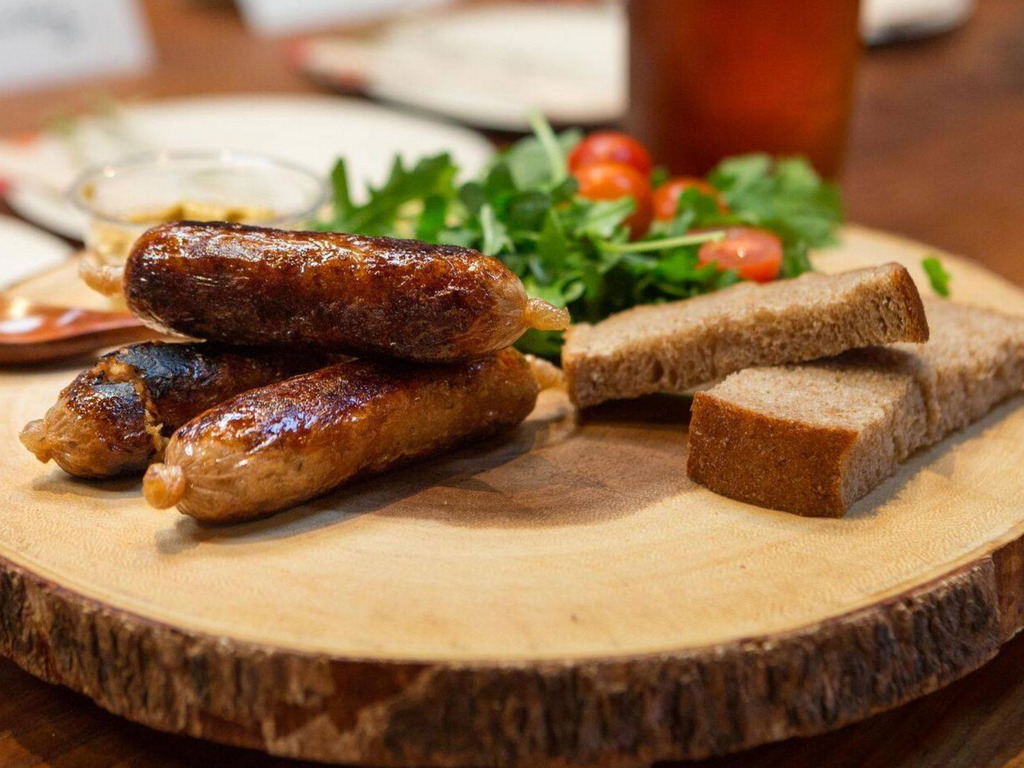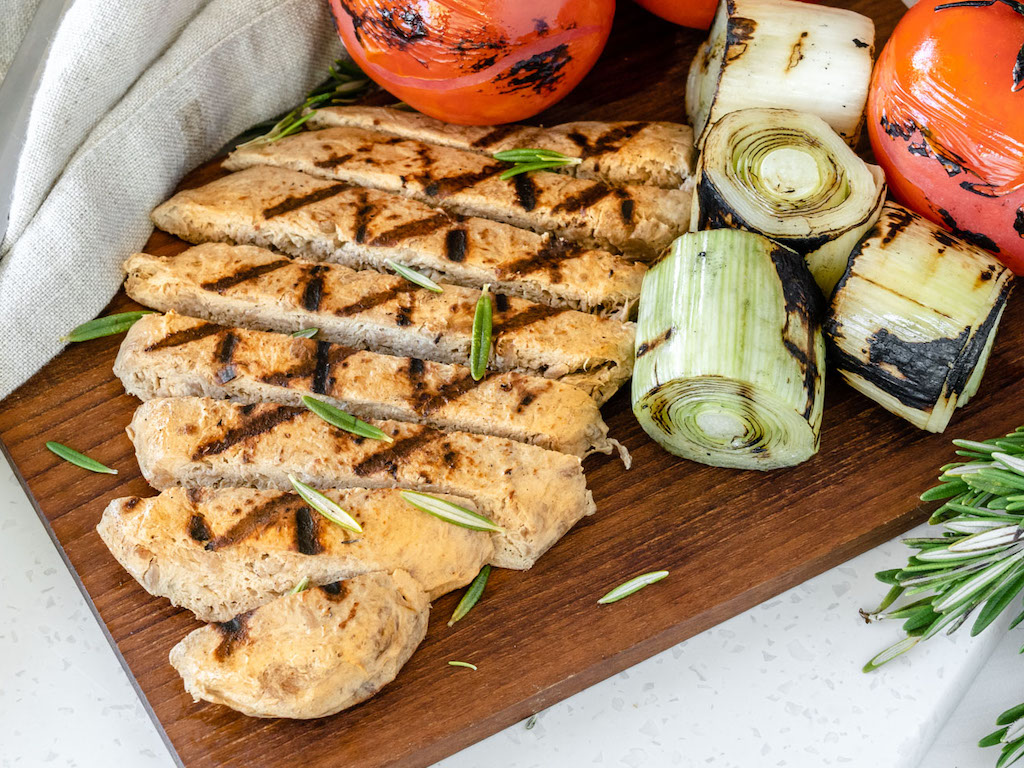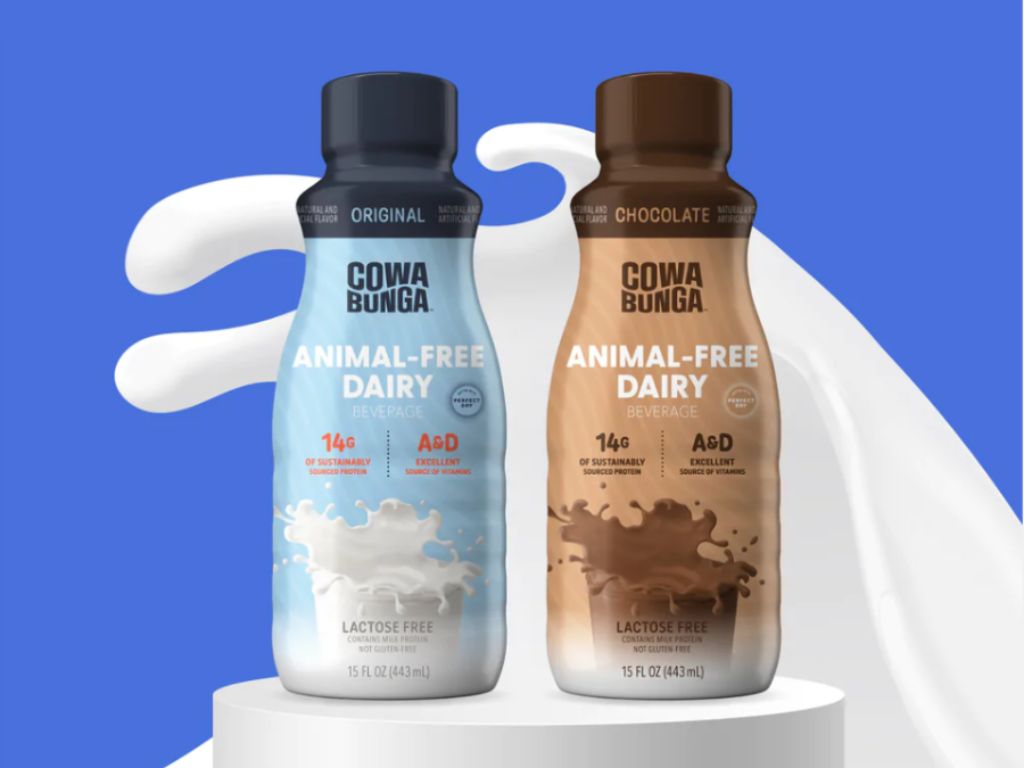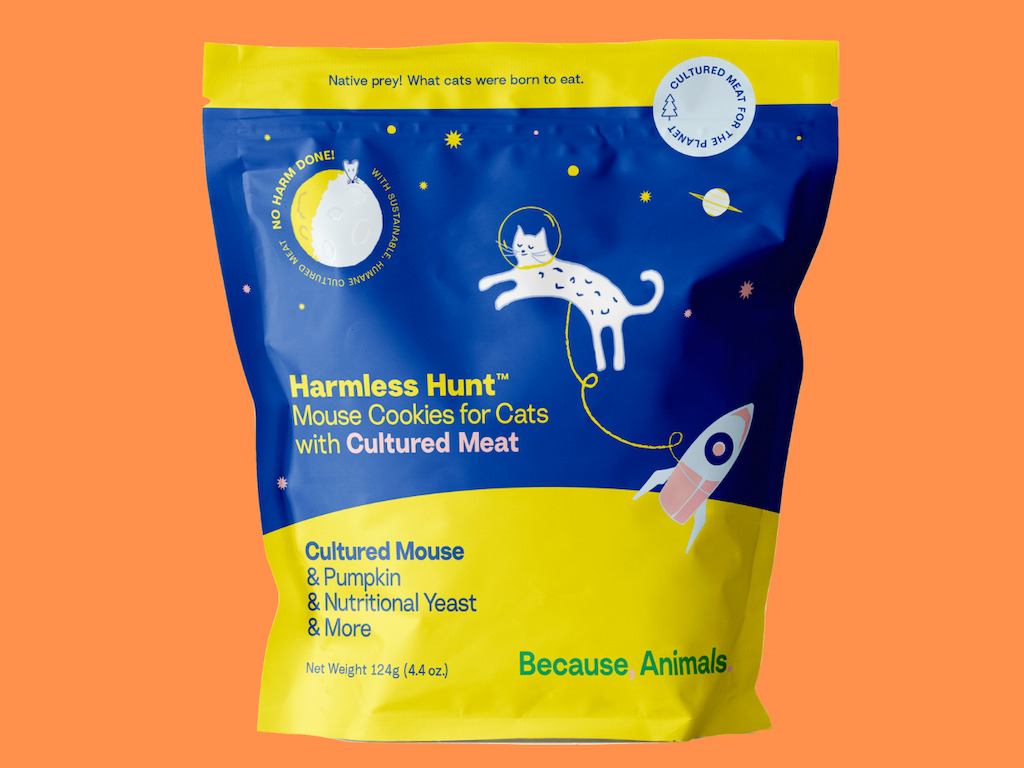11 Mins Read
What does the alt protein industry have in store for us amidst a very turbulent 2023 ahead? A lot, actually. Below, I share my 12 crystal ball takes (in no particular order).
I sat down to write these trends and ended up writing a whole piece about where plant-based meat is going. Amidst predictions, I wanted to share my views on the sector as a whole, given all the brouhaha out there, and I think it’s worth a read.
Author’s Note: This is my third year making alt-protein-specific trend predictions. You can see my 2021 ones and how I did (pretty well, actually!), and here’s last year’s list, as well as my performance (less well, 2022 was rough folks, but still in the running).

1) Blended Products: Cultivated Fat, Meet Plant-Based Meat
This one may seem obvious for industry insiders and has been coming for a while. While affordable and scalable cultivated meat flesh on supermarket shelves is likely years away, cultivated fat is achievable and startups are already collaborating to create sausages, meatballs and more. So much more to come here, because fat is an integral part of animal meat’s mouthfeel so a cultivated fat add-on could help win over those sitting on the plant-based meat fence.
2) Affordable Flexitarianism
Food shoppers are watching their budgets more than ever. They are chasing value and that means brands need to be creative on the pricing front. I foresee a slew of more affordable plant-based products, perhaps reformulated to be cheaper to manufacture. In this vein, my crystal ball suggests a lot more vegan-ready meals (same as I predicted last year) and more plant-based brands venturing into this space à la Impossible Bowls. Also, lots more value packs coming your way, such as Quorn’s Costco Value Packs and Beyond Meat’s pandemic value pack iterations.

3) Fungi Forward Fun
I once hosted a Clubhouse chat during which participants told me that many Americans are scared of mushrooms and don’t buy them. I am not sure if that is still true (this was 2020) but as someone who lives in Asia, it’s really hard to believe. Here in Hong Kong, we regularly eat at least 5 kinds of mushrooms every week. Mushrooms are delicious, versatile, budget-friendly, and ideal as replacements for animal meat in so many dishes because of their terrific textures and minimal processing. I’m thinking in 2023 we will see more in this space. And in various formats too, from mycoprotein to mycelium and beyond.
4) More Culinary Diversity, Please
One of the reasons alt protein is still such a niche sector is that it remains far too Western-centric. A majority of the products that have been launched are burgers, nuggets and mince, most with European-derived cuisines in mind. Folks, the proverbial “West” is basically less than a billion people. The 7-billion-plus-strong ROW (rest of world) is who we need to be serving (especially since animal protein demand is growing fastest there) and there are hundreds of cuisines begging for smarter protein product drops. I predict a lot more action on this front, particularly in Asia, where the alt-protein revolution is only just beginning. This prediction dovetails well with general food trend reports that are forecasting mega growth in ROW culinary heritages including Cambodian, Filipino, Nigerian, Dominican and many more. Alt protein should serve wider food trends and meet consumers where they are, which is a much more diverse and authentic gastronomic place.

5) Canteen Impact
A lot of the data around plant-based meat sales being flat is based on SPINS data, a company that tracks retailer sales, ie grocery stores. What’s missing from this is food service data- ie how much plant-based meat/dairy/seafood/eggs large-scale food catering companies like Sodexo and Compass Group are cooking up. These companies have two main audiences: students (schools and universities) and employees (corporate cafeterias) and collectively serve hundreds of millions of people a day (Sodexo: 100+ million, Compass: 150+ million). When they adjust their menus/feature plant-based options, they can have a ginormous impact in terms of lowering our food emissions. And these companies are committed to plant-based meat in a big way. And not just out of good-heartedness, but also because they have their own Net Zero goals, and decreasing the volume of high-emission animal protein products on their menus is a big part of achieving those goals. Further, in a Gen Z-forward world, catering to diversity is KEY. That means offering up menu items to suit all kinds of dietary preferences. Both education and corporate institutions are under increasing pressure to do so, which means the food service operators have to adapt.
Note: SPINS data doesn’t include fast food/QSR chain data either. And there’s plenty to be excited about on that front too. Moral of the story: plant-based meat is going nowhere.
6) Nostalgia Branding Reigns Supreme
I can’t say this is a Sonalie original, but after having read over a dozen Gen Z trend reports, I feel low-key confident in telling you: expect a lot more nostalgia-induced packaging across all food sectors (currently dominating snacks and beverage aisles), including meat, dairy and seafood analogues. When the economy sucks, we all crave comfort, and that’s what nostalgia branding offers our loud and proud inner child. This trend goes beyond packaging- it extends to product selection too. Think animal-free dairy mac and cheese boxes, vegan fish fingers, plant-based instant ramen, “chickn” pot pie, and more.

7) Big Food x Animal-Free Dairy Go Steady
This is a continuation of my 2022 prediction around precision fermentation- I had a feeling the space was going to take off in a big way and it did. But what I foresee for this year is Big Dairy going full-steam ahead on animal-free dairy formulations, from cheese to yogurt to milk to ice cream. The headlines have already started from the likes of giants such as Fonterra, Bel Group, Unilever and Nestle among others. One of the biggest drivers of these collaborations is the industry’s need to account for their GHG emissions profile. For years, meat took most of the climate activist heat. But in the past couple of years, dairy has come under the spotlight, and rightly so. Expect to see a slew of announcements on this front.
8) Healthy Plus Formulations
In an age of inflation and recessionary pressures, companies must give their consumers every reason to choose their brands over others. And for alt protein brands, who are already perceived to be more expensive and “less than”, health is where they should be investing when it comes to product formulation. We need to give consumers more than just meat replacements and I think some brands get it and are going to jump on this. While I have predicted cleaner-label products before (to muted success, I still think plant-based brands need to do better in this area), this is more than that. Gen Z consumers in particular are hungry for food products that are both delicious AND good for you. Study: the phenomenon that is Mid Day Squares, aka functional organic chocolate energy bars. Also look at Athletic Greens’ unicorn valuation and Olipop fiber-rich prebiotic soda (because soda can’t just be soda anymore). Plant-based meat/seafood brandings should be experimenting with super nutrients and functional ingredients to give consumers that healthy plus bang for their buck (plus with the new US FDA healthy food guidelines, they may not have a choice).

9) Alt Protein Pet Food FTW
As much as millennials delayed having kids, millennials are choosing to forage the experience altogether. And they are replacing babies with pets. Pet ownership is on the rise and we can’t help but want to spoil our fur babies. That means best-in-class nutrition and food. Pair that with social media ensuring that more pet owners than ever grasp the environmental cost of their furry friends, and this is a massive area of opportunity. There’s already some decent action on the plant-based side of things. But I’m thinking the cultivated pet food opportunity is going to grow. My prediction? Not only will you see more alt-protein pet companies burst onto the scene, but you will also see some existing human-focused players diversify into the pet world, especially seeing as Big Food is jumping into this 112+ billion dollar opportunity.
10) The Quiet Quitting of PB Founders
Word on the VC street is that funding has dried up for plant-based meat. Not only for economic reasons (inflation, looming recession, freefalling public markets), but also for category reasons (plant-based meat is over, or haven’t you heard?)- too many brands, lackluster products, non-recurring customers. Less funding doesn’t just mean fewer new startups, it also means more existing startups will have to close shop because they will run out of money. I predict that over the next year, we will lose 10-20% of the plant-based meat landscape. Unlike with other industries, you won’t hear about it in your Linkedin feed. Why? Well because the majority of these companies (and their investors) are impact-driven. And it’s not good for the mission to talk about failure too much. It just feeds the (Big Meat Lobby) haters. And when you are talking about the future of the planet, the stakes (steaks!) are just too high. Hence…the quiet quitting of plant-based founders.
11) The Politicisation of Alt Protein
Folks it’s been fun. But our time in the “new and innovative sector” sun has ended. For the first few years, Big Food (and Big Meat, Big Dairy, Big Seafood) was happy to let us grow and prosper in our tiny little market share corner. But we’ve made enough of a scene to get their attention and they aren’t too happy about how we’ve managed to get a decent chunk of their customers to question their product’s ethics/health/eco credentials. In my 2021 edition I predicted the revenge of Big Meat. And that’s more than come true. But it’s about to get a lot more sinister. As the industry continues to mature, Big Food is coming for us with its big guns (think Big Oil tactics), and that means politics. We are headed for an Alt Protein = Woke Liberal, Red Meat = Healthy Conservative world. It’s going to get ugly. Examples given: The Nebraska governor’s raging against plant-based meat ahead of the US midterm elections. Big Dairy infiltrating TikTok with anti-oat milk content. Farmers across the world are rebelling against climate action. More to come.
12a) Cultivated Meat Regulatory Approval Continues – US
Last year I predicted that we would see regulatory approval in the US or Israel. I was semi-right. Cultivated chicken meat maker Upside Foods made history to be the first US company to earn GRAS status by the FDA (aka their chicken was deemed safe for human consumption). But that’s only half the battle. To sell their product commercially, they need approval from the USDA. I predict that at least 1 US company gets USDA approval by the end of the year. Upside is strongly positioned to be the chosen one, but cultivated sashimi startup Wildtype could just as likely achieve the milestone. As could BlueNalu.

12b) Cultivated Meat Regulatory Approval Continues – Global Outlook
I predict the Singaporean government will grant commercial approval to at least 1 local cultivated meat player (I vote for MVP Shiok Meats, which focuses on cultivated seafood), and at least 1 more foreign player (likely Dutch cultivated pork player Meatable or Mosa Meat, given recent announcements).
Despite what remains an optimistic outlook for cultivated meat in China and some recent notable discussions, I don’t believe we will see commercial approval there in 2023. And I have changed my mind about Israel. While I do believe the country is home to some of the most exciting alt protein startups in the world (I do predict the country will continue to produce incredible cultivated meat innovation) and the government is very supportive with funding and talent, commercial approval is unlikely in 2023, thanks to a new ultra-conservative government and domestic geopolitics.
Over in Europe: again, lots of innovation and industry support, but Brussels is well known for being ultra-careful when it comes to approving novel food technologies (see: GMOs) so while I do think the Continent will eventually say yes to cultivated meat, it’s going to take a while. As for the UK, well, while some folks believe it will lead in this area, I remain skeptical. Firstly, their domestic political landscape is a mess (ref: every political headline for the past 4 months!) and secondly, UK farmers have a powerful voice. The government is not going to rock that boat.
For an overview of the ten most supportive countries when it comes to cultivated meat, see here.
Other stuff I am watching:
- Seaweed as a super ingredient > we’ve barely scratched the surface of this wonder group of sea vegetables and we will be seeing more seaweed-fortified foods across the board as companies scramble to make their products more sustainable and more healthy (seaweed serves both).
- More upstream supply chain biotech funding > (machinery, serums, scaffolding, cell lines) > as VCs get increasingly gun-shy around backing new cultivated meat and precision fermentation end-product teams, they will turn to upstream technology plays, which is very good for the space. The sector can’t scale with sorting out the fundamentals.
- Alt food growth > we need to rethink how we produce more than just meat, seafood, eggs and dairy. Coffee, chocolate, palm oil, and sugar- all have problematic ethical and environmental footprints, from child labor to exploitative working conditions to deforestation. So many more companies will come to market to (try to) wrong the rights!





